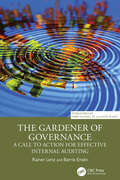- Table View
- List View
The Future of Work: Shaping New Work with Flexibility and Legal Certainty
by Gerlind Wisskirchen Inka KnappertsbuschThis book takes readers on a journey into the future of work. Following the influence of the COVID-19 pandemic, working conditions have become more flexible than ever before. The freedoms granted within this framework continue to be demanded by many employees. There are also numerous companies that have had predominantly positive experiences with this change and would like to continue with it. Against this backdrop, it is to be expected that the shift away from a traditional working environment – due to the four influencing factors of demographic change, skills shortages, digitalisation and artificial intelligence – will accelerate in the future. This book provides an overview of the various design options for New Work and highlights their respective advantages and disadvantages. It also analyses new trends and forecasts relating to the future of work. In addition, the relevant legal framework is presented in a concise and easy-to-understand manner. This book provides you with the tools you need to actively shape the future of work in your company in a legally compliant manner. The editors Dr. Inka Knappertsbusch is a lawyer specializing in employment law and employee data protection at the international commercial law firm CMS Germany. She advises companies primarily on restructuring and works agreements, in particular on issues related to IT and new work. Her work also focuses on data protection and artificial intelligence in employment relationships. She is the co-editor of the book "Arbeitswelt und KI 2030". Dr. Gerlind Wisskirchen is a partner and lawyer at the international commercial law firm CMS Germany and advises multinational corporations in particular on restructuring, national and international employment law and compliance issues. She is also an expert on the digitalisation of the world of work, with experience as a keynote speaker, author and lecturer and is the editor of the report "Artificial Intelligence and Robotics and Their Impact on the Workplace" for the Global Employment Institute. The translation was done with the help of artificial intelligence. A subsequent human revision was done primarily in terms of content.
The Future of the ASEAN Economic Integration
by Kiki VericoVerico discusses the ASEAN economic integration from dual perspectives of time span (trade, investment and finance) and framework (bilateral, sub-regional, regional and regional plus). The work is a comprehensive study of the integration in the wake of the ASEAN Economic Community (AEC)’s inauguration in late 2015. Examining various economic agreement levels from the ASEAN Free Trade Area (AFTA), Bilateral Free Trade Agreement (BFTA) and the AEC to financial integration in ASEAN, Verico attempts to envisage the future of ASEAN in completing its regional economic integration from trade to investment and finance. Verico argues that, in the absence of a customs union, ASEAN must utilize the open-regionalism frameworks of the ASEAN Plus One, ASEAN Plus Three, Regional Comprehensive Economic Partnership and others in order to shift its economic integration level in this way.
The Future of the Commercial Contract in Scholarship and Law Reform: European And Comparative Perspectives
by Maren Heidemann Joseph LeeThis book explores commercial contract law in scholarship and legal practice, suggests new research agendas and provides a forum for debate of typical issues that might benefit from further attention by scholarship and legislatures. The authors from over ten different jurisdictions take an international and comparative approach. Not confined to EU law it re-opens the debate internationally and seeks to reclaim the wider meaning of European law as rooted in geography and cultural legal heritage. There is a need to focus on commercial contracts in more detail in research and legislation. The transactional approach, the role of recent law reform, including the new French Civil Code, cross-border dealings, substantive contract law in public international law and ICSID arbitration as well as current contractual practices like OEM, CSR, contractual co-operation, sustainability and intra-corporate arbitration contribute to a wider regulatory outlook for commercial transactions.
The Future of the International Criminal Court: Reform, Consensus, and Relations with the USA
by Iseghohime Daniel EhighaluaThis book presents the argument that solution-driven policy and treaty changes, if faithfully implemented, will rekindle the relevance of the International Criminal Court (ICC) in combatting and prosecuting atrocity crimes. This work examines how the International Criminal Court could be re-envisioned to perform optimally, and why such reform is urgent. It also discusses the position of the USA towards the court and explores why it has been unable to transition from marginal engagement to full spectrum support by signing and ratifying the Rome Treaty 1998. The conceptual frameworks deployed range from how the US construes its ‘national interest’ to geo-political balancing and the present rudderless state of the rules order, in addition to the personal predilections of US Presidents and the Court’s dysfunctional state. The objective is to show that if the ICC does not engender reforms internally, it will not survive the fissiparous tendencies innate in the presently fractured rules order. The work argues that only foundational reforms around treaty amendments along with institutional realignment of roles and responsibilities of the Court’s principal officers will yet rescue it. The book will be of interest to researchers, academics and policy-makers working in the areas of International Criminal Law and International Relations.
The Future of the Law of Contract (Markets and the Law)
by Michael FurmstonThe Future of the Law of Contract brings together an impressive collection of essays on contract law. Taking a comparative approach, the aim of the book is to address how the law of contract will develop over the next 25 years, as well as considering the ways in which changes to the way that contracts are made will affect the law. Topics include good faith; objectivity; exclusion clauses; economic duress; variation of contract; contract and privacy law in a digital environment; technological change; Choice of Court Agreements; and Islamic finance contracts. The chapters are written by leading academics from England, Australia, Canada, the United States, Singapore and Malaysia. As such, this collection will be of global interest and importance to professionals, academics and students of contract law.
The Future of the Law of the Sea
by Gemma AndreoneThis book is open access under a CC BY-NC 4. 9 license. It explores the diverse phenomena which are challenging the international law of the sea today, using the unique perspective of a simultaneous analysis of the national, individual and common interests at stake. This perspective, which all the contributors bear in mind when treating their own topic, also constitutes a useful element in the effort to bring today's legal complexity and fragmentation to a homogenous vision of the sustainable use of the marine environment and of its resources, and also of the international and national response to maritime crimes. The volume analyzes the relevant legal frameworks and recent developments, focusing on the competing interests which have influenced State jurisdiction and other regulatory processes. An analysis of the competing interests and their developments allows us to identify actors and relevant legal and institutional contexts, retracing how and when these elements have changed over time.
The Future of the Post-industrial Society: Individualism, Creativity and Entrepreneurship (Palgrave Studies in Classical Liberalism)
by David Emanuel AnderssonThis book studies the ongoing transition from an industrial to a creative (or post-industrial) society and how the creative society depends on a ‘soft infrastructure’ of individualist values and institutions. It explains this by looking first at the key actors in the creative society: creative individuals and entrepreneurial individuals, using insights from social and cognitive psychology and the economic theory of entrepreneurship. It shows how individual creativity and entrepreneurship are supported by both cultural individualism, based on the work of political scientists Ronald Inglehart and Christian Welzel, as well as political individualism, the principles of a democratic market economy guided by classical liberalism. The book offers a number of policy implications that result from the connection of this multidisciplinary reconceptualization of individualism to economic creativity. It discusses a system of property rights that accommodates the creation of new property, ranging from the result of what we normally think of as product innovation to larger-scale innovations embodied in the formation of new lifestyle communities. It also considers examples such as universities that are more open to experimentation and more autonomous from government regulation, and a more liberal immigration policy that may result from the positive association between population diversity and creativity. This book is intended to support further interdisciplinary and multidisciplinary research on the creative society (also known as post-industrialism, the postmodern society or the knowledge-based society). It will be of interest to academics and postgraduate students working in political economy, entrepreneurship, institutional economics, Austrian economics, and public policy.
The Future of the UN Sustainable Development Goals: Business Perspectives for Global Development in 2030 (CSR, Sustainability, Ethics & Governance)
by Samuel O. Idowu René Schmidpeter Liangrong ZuThis book provides a business-oriented analysis of the United Nations (UN) Sustainable Development Goals (SDG). In order to assess their impact on businesses and corporations, the book addresses all 17 goals and a broad range of industries. Gathering contributions from Africa, Europe and Asia, it presents both critical reviews and case studies. In turn, the book seeks to predict likely developments during the next decade. To do so, it examines evidence from today’s business world and how companies and corporations have been adopting the SDGs since their release. In this regard, it discusses the changes that will be required and how the agenda will affect the continent’s development path. An underlying theme throughout the book is the role of monetary value and investment for sustainable development: whether through financing, enhanced turnaround resulting from a more educated population, or more socially innovative entrepreneurs.
The Future-Ready Leader: Accelerated Learning for Business Success
by Peter Lorange Karin MugnainiIf you're a business leader looking to stay ahead of the curve, this book is an essential guide. It offers a comprehensive overview of the major trends shaping the future of business, drawing on reviews of 70 recent management books and interviews with 21 senior leaders.What sets this book apart is that it's grounded in the real-world experiences of active business leaders. From political affairs to family businesses and everything in between, each of the eight parts offers expert insights on the challenges and opportunities that lie ahead. Whether you're seeking to adapt your strategy to the external environment, lead your organization towards fulfilling its mission, or simply stay ahead of the competition, this book has got you covered.
The GANNI Playbook: How to Get Started Creating a Responsible Business
by Nicolaj Reffstrup Brooke Roberts-Islam'It’s Ganni’s journey from cult Scandi favourite to a leader in the sustainability space'Emily Chan, VogueThis book is about what happened when a business leader decided not to bury his head in the sand about climate change; when he found the conversation with his kids about floods from melting ice caps too painful. This book asks what it means to force yourself to take a different business path, where the destination is a responsible and profit-making business.In The GANNI Playbook, Nicolaj Reffstrup unveils the strategies that propelled GANNI to international stardom, while candidly unravelling the cultural, operational and creative components required to construct a business that embraces an uncertain future.'GANNI offers a blueprint for how to embed sustainability from within'Rachel Cernansky, Vogue Business'What's the secret to sustainable success? There is no secret. GANNI is willing to share. In fact, it’s doing exactly that'Rose Dodd, Sleek
The GCC Banking Sector: Topography and Analysis
by Abdullah Al-Hassan May Khamis Nada OulidiA report from the International Monetary Fund.
The GDPR Challenge: Privacy, Technology, and Compliance in an Age of Accelerating Change
by Amie TaalConsent is necessary for collecting, processing and transferring Personal Identifiable Information (PII) and sensitive personal data. But to what extent? What are the limitations and restricts to avoid penalties under The General Data Protection Regulation 2018 (GDPR) rules, which may be up to 4% of annual global turnover or €20 million (whichever is higher), enforcements and sanctions? Under GDPR Article 51, each EU Member State shall maintain an independent public authority to be responsible for monitoring the application of this regulation to protect the fundamental rights of data subjects (Supervisory Authority). The Supervisory Authority has powers to issue warnings, conduct audits, recommend remediation, order erasure of data and suspend data transfers to a third country.GDPR has changed the way data is used, accessed and stored. It's reach extends well beyond the European Union and is the basis of other data privacy laws around the world.This book provides a review and guidance on implementing and compliance of GDPR while taking advantage of technology innovations and supported by real-life examples. The book shows the wide scope of applications to protect data privacy while taking advantage of processes and techniques in various fields such as eDiscovery, Cyber Insurance, Virtual-based Intelligence, Information Security, Cyber Security, Information Governance, Blockchain and Biometric technologies and techniques.
The Gacaca Courts, Post-Genocide Justice and Reconciliation in Rwanda
by Phil ClarkSince 2001, the Gacaca community courts have been the centrepiece of Rwanda's justice and reconciliation programme. Nearly every adult Rwandan has participated in the trials, principally by providing eyewitness testimony concerning genocide crimes. Lawyers are banned from any official involvement, an issue that has generated sustained criticism from human rights organisations and international scepticism regarding Gacaca's efficacy. Drawing on more than six years of fieldwork in Rwanda and nearly five hundred interviews with participants in trials, this in-depth ethnographic investigation of a complex transitional justice institution explores the ways in which Rwandans interpret Gacaca. Its conclusions provide indispensable insight into post-genocide justice and reconciliation, as well as the population's views on the future of Rwanda itself.
The Game Changer: How Leading Organisations in Business and Sport Changed the Rules of the Game
by Alistair GrayThe Game Changer powerfully demonstrates how some organisations in business and sport have done more than raise their performance; they have also changed the rules of the game or the game itself within their industry. It gives examples of the strategies and governance programmes that have emerged to accomplish this, and the challenges of executing them. This book brings to life strategic management in business, sport and not-for-profit organisations. It explores many of the theories taught on MBA and other professional programmes through case studies from the worlds of sport and business, written by authors who have played a part in the change. Alistair Gray has spent much of his career in senior roles in these sectors and brings a unique insight to the field, as well as providing the reader with tools and techniques for improvement in governance and performance. The Game Changer is essential reading for both professionals looking for methods to improve their own performance and to embed strong principles of governance, and business students looking for real-life lessons from practice.
The Gang Life: Suppression and Prevention
by Robert Matthew Brzenchek Ben Pieper Garrick PlonczynskiThe Gang Life: Laugh Now, Cry Later examines the criminal gangster mindset and offers gang prevention strategies, using real-world examples to demonstrate a holistic approach toward combatting this surging societal problem. The text outlines the evolution of gang membership from a state of interest, to association, to hardcore "O.G." (Original Gangster) status, and explores the evolution of law enforcement’s multi-pronged approach to combating criminal street gang violence, from the catch-and-release mentality of the 1970s and 1980s to today’s collaboration with private organizations such as Boys & Girls Clubs. In-depth profiles, case studies, and lengthy histories of gangs, gang members, and their transformations are provided to demonstrate the deleterious effect of gangs on society. Designed for criminal justice students and for practitioners in the field, this text offers readers a holistic approach toward gang prevention from three nationally awarded educators and gang investigators.
The Ganga
by Pranab Kumar ParuaThe geo-hydro-morphometry of the river Ganges has a history of long and wide variations as the river is continuously fed by the high Himalayas hill ranges, the highest in the world. The river is categorized as an international one, passing through several independent countries. The major flow of the river used to flow through the branch river, Bhagirathi-Hooghly on the banks of which both city and port of Calcutta (now renamed Kolkata) are situated. However, due to massive tectonic and morphological changes, the flow through the branch river has gradually decreased resulting in enormous damages to the port and the city. After more than a century of investigations on the probable causes of deterioration and its remedies, a barrage across the river had been constructed near a place called Farakka in the Murshidabad district of West Bengal, India for diversion of a part of lean season flow (40,000 cu secs) from the parent river to the branch river for the resuscitation of the branch river and revitalization of the port of Calcutta. The turmoil started since the construction of barrage between 1965-1975 and the major neighbouring countries, India and Bangladesh, were locked in the dispute over sharing the water of the parent river. After several rounds of discussions at different levels between the two countries, short-term agreements were signed two times, one in 1977 and the other in 1985, and finally one long term Treaty was signed in 1996 between the two countries in an atmosphere of peaceful co-existence. Audience: The book will be of interest to researchers and scientists, professionals and policymakers in water resources management and environmental science, conservation policy and development research.
The Gangs of Zion: A Black Cop's Crusade in Mormon Country
by Ron StallworthNew York Times bestselling author of Black Klansman, Ron Stallworth, returns with another firsthand account of trailblazing police work in the most unlikely place for a Black cop in the &’90s. Determined to pursue his passion for undercover work wherever it leads, Ron Stallworth finally lands in Salt Lake City, Utah. Once again, he&’s an outsider—not only as a Black man on a mostly white police force but also as an unapologetic nonbeliever in a state dominated by the Church of Jesus Christ of Latter-Day Saints. But soon after his first drug bust in the Beehive, Stallworth makes a startling discovery—Bloods and Crips are infiltrating Mormon Country, threatening to turn the deeply conservative community into a hotbed of crime. Kids are bombing homes while carrying pocket versions of the Book of Mormon, yet his fellow cops are in denial that gangs are wreaking havoc in their Christian town. Now Stallworth has a new mission. Whether facing off with skinheads at a downtown bar or schooling white Crips blasting &“F*ck tha Police,&” he is intent on stemming the tide of gangs into the state. But those he expected to be his allies either have their heads in the sand or their own agendas—from the racist Mormon legislator to the community activist exploiting a fatal gang incident to spread paranoia over an imaginary race war. As he butts heads with these so-called leaders, Stallworth also realizes that gangsta rap has the key to the g-code. He becomes obsessed with—even defensive of—the music he once loathed and puts himself on the front lines of America&’s culture war. Now he&’s spitting uncensored lyrics before Congress and taking the stand in the 1993 murder case that puts hip-hop on trial. But the more Stallworth speaks truth to power, the more determined the gatekeepers in Utah are to silence him, and not even twenty-three years of police work could prepare him for how low they would stoop.
The Garden of God: Toward a Human Ecology
by Pope Benedict XVIIn this collection of his writings, Pope Benedict XVI speak to the important relationships between the environment, Catholic social teaching, and theology. During his papacy, Pope Benedict XVI repeatedly drew attention to the environment. He spoke of preserving it, such as his address concerning the Amazon rainforest and his letter regarding the Arctic, and of distributing its vital resources—such as water—more equitably. Benedict led by example when the Vatican became the first carbon-neutral country in the world. This book collects Benedict&’s many audiences, addresses, letters, and homilies on a wide range of topics dealing with the world about us. The major themes and connections he explores include creation and the natural world; the environment, science, and technology; and hunger, poverty, and the earth&’s resources. In these pages, Benedict insists that if we truly desire peace, we must consciously nurture all of creation. He speaks in favor of alternative energy while speaking out against the spread of nuclear weapons and threats to biodiversity. He urges sustainable development, equitable distribution of food and water, and an end to hunger. In summation, Benedict argues that our love of God should cause us to protect the environment, and that in turn, our heightened appreciation of the natural world will draw us closer to God.
The Gardener of Alcatraz: A True Story
by Emma Bland SmithA prisoner gardens his way to freedom in this inspiring picture-book biography.When Elliott Michener was locked away in Alcatraz for counterfeiting, he was determined to defy the odds and bust out. But when he got a job tending the prison garden, a funny thing happened. He found new interests and skills--and a sense of dignity and fulfillment. Elliott transformed Alcatraz Island, and the island transformed him. Told with empathy and a storyteller's flair, Elliott's story is funny, touching, and unexpectedly relevant. Back matter about the history of Alcatraz and the US prison system today invites meaningful discussion.
The Gardener of Governance: A Call to Action for Effective Internal Auditing (Security, Audit and Leadership Series)
by Rainer Lenz Barrie EnslinThis book builds on the popular GARDENER OF GOVERNANCE article, which enjoys amazing traction in the professional community globally and has been translated into 25+ languages. The Lenz and Jeppesen (2022) thought-piece introduced the 5 "Ps" as paths for the betterment of internal auditing: People, Public, Performance (Prosperity), Purpose (Profession) and Planet. These main fields of action and focus for the internal audit profession may determine the future role of internal auditing, its legitimacy, relevance and significance. The book aims to provide practical guidance for performing impactful internal audit assignments. Some readers will no doubt view the authors as unorthodox and the book may be a stretch for the purist, insisting on adherence to traditional rules.It is pleasing to see that the new Global Internal Audit Standards advocate a pragmatic and holistic approach, which should further stimulate internal audit functions moving into uncharted territory that may require from them to become more resourceful in their approach as advocated for by the authors. This book is an inspiration and encouragement for all internal auditors who want to do better and aim higher, particularly the forthcoming generation of internal auditors who are open-minded and who may sometimes doubt themselves because of opposition or insecurity. We believe that internal auditors who absorb the knowledge and make it their own will benefit from this book on their career trajectory.This easy read is relatable, engaging and convincing to support internal auditors globally who are seeking to widen their repertoire on their journey to become modern and effective internal auditors. This book is relevant and will be insightful to internal auditors, students and lecturers, as well as other stakeholders including senior and executive managers and board members. Drawing on Rainer’s vast practical expertise gained from over 300 audits in more than 50 countries, along with his series of publications and adding Barrie’s hands-on advice benefitting from 30 years of entrepreneurial experience, the authors create an interesting blend of creative authoring that challenges the status quo and advises emerging internal auditors on becoming more impactful and effective.We’re dropping the pebble in the pond. Let’s see how far the ripples spread and to what effect.
The Gay Science: With A Prelude In Rhymes And An Appendix Of Songs (Dover Thrift Editions)
by Friedrich NietzscheAlthough dour in appearance and formidable in reputation, Friedrich Nietzsche was an ardent practitioner of the art of poetry—known in twelfth-century Provençal as "the gay science." This extensive collection of prose and verse offers a sophisticated treatment of the philosophical themes and views central to his thinking, as well as the ideas that proved most influential to later philosophers. Dating from the era when Nietzsche was at the peak of his intellectual powers, most of this book was written just before Thus Spoke Zarathustra, and the rest of it five years later, after Beyond Good and Evil. Zarathustra makes his first appearance in these pages, along with the author's well-known proclamation of the death of God. Readers will find this volume a wellspring for some of Nietzsche's most sustained and thought-provoking discussions of art and morality, knowledge and truth, the intellectual conscience, and the origin of logic, as well as the largest collection of Nietzsche's published poetry.
The Gender of Reparations
by Ruth Rubio-MarínReparations programs seeking to provide for victims of gross and systematic human rights violations are becoming an increasingly frequent feature of transitional and post-conflict processes. Given that women represent a very large proportion of the victims of these conflicts and authoritarianism, and that women arguably experience conflicts in a distinct manner, it makes sense to examine whether reparations programs can be designed to redress women more fairly and efficiently and seek to subvert gender hierarchies that often antecede the conflict. Focusing on themes such as reparations for victims of sexual and reproductive violence, reparations for children and other family members, as well as gendered understandings of monetary, symbolic, and collective reparations, The Gender of Reparations gathers information about how past or existing reparations projects dealt with gender issues, identifies best practices to the extent possible, and articulates innovative approaches and guidelines to the integration of a gender perspective in the design and implementation of reparations for victims of human rights violations.
The Gene, the Clinic, and the Family: Diagnosing Dysmorphology, Reviving Medical Dominance (Genetics and Society)
by Joanna LatimerWhile some theorists argue that medicine is caught in a relentless process of ‘geneticization’ and others offer a thesis of biomedicalization, there is still little research that explores how these effects are accomplished in practice. Joanna Latimer, whose groundbreaking ethnography on acute medicine gave us the social science classic The Conduct of Care, moves her focus from the bedside to the clinic in this in-depth study of genetic medicine. Against current thinking that proselytises the rise of laboratory science, Professor Latimer shows how the genetic clinic is at the heart of the revolution in the new genetics. Tracing how work on the abnormal in an embryonic genetic science, dysmorphology, is changing our thinking about the normal, The Gene, the Clinic, and the Family charts new understandings about family, procreation and choice. Far from medicine experiencing the much-proclaimed ‘death of the clinic’, this book shows how medicine is both reasserting its status as a science and revitalising its dominance over society, not only for now but for societies in the future. This book will appeal to students, scholars and professionals interested in medical sociology, science and technology studies, the anthropology of science, medical science and genetics, as well as genetic counselling.
The Genealogy of Morals (Dover Thrift Editions)
by Friedrich NietzscheWritten in response to a book on the origins of morality by his erstwhile friend Paul Rée, the three essays comprising The Genealogy of Morals -- all three advancing the critique of Christian morality set forth in Beyond Good and Evil -- are among Nietzsche's most sustained and cohesive work.In the first essay -- starting from a linguistic analysis of words such as "good," "bad," and "evil" -- Nietzsche sets up a contrast between what he calls "master" morality and "slave" morality and shows how strength and action have often been replaced by passivity and nihilism. The next essay, looking into the origins of guilt and punishment, shows how the concept of justice was born -- and how internalization of this concept led to the development of what people called "the soul." In the third essay, Nietzsche dissects the meaning of ascetic ideals.It is not Nietzsche's intention to reject ascetic ideals, "slave" morality, or internalized values out of hand; his main concern is to show that culture and morality, rather than being eternal verities, are human-made. Whether or not you agree with all of his conclusions, his writing is of such clarity and brilliance that you will find reading The Genealogy of Morals nothing short of exhilarating.
The Genealogy of Terror: How to distinguish between Islam, Islamism and Islamist Extremism (Law and Religion)
by Matthew L. WilkinsonIn the first two decades of the twenty-first century, the events of 9/11, 7/7, the War on Terror and the Caliphate and atrocities of the so-called Islamic State have dominated Western consciousness and wreaked havoc in parts of the Muslim-majority world. In their wake, a spate of books has been written explaining the phenomenon of Islamist radicalisation and Jihadism. Nevertheless, for normal citizens, as well as scholars of religion and legal professionals, the crucial question remains unanswered: how is mainstream Islam different from both Islamism and the Islamist Extremism that is used to justify terrorist violence? In this highly original book, which draws upon the author’s experience as an expert witness in Islamic theology in 27 counter-terrorism trials, the author uses the idea of the Worldview, as well as traditional Islamic theology, to answer this question. The book explains not only what Mainstream Islam, Ideological Islamism and Islamist Extremism are in their broad philosophical characteristics and theological particulars, but also explains comprehensively how and why they are both superficially related and yet essentially and fundamentally different. In so doing, the book also illuminates the cast of characters and the development of their ideas that constitute Mainstream Islam, Ideological Islamism and the Non-Violent and Violent Islamist Extremists who constitute the Genealogy of Terror.
























